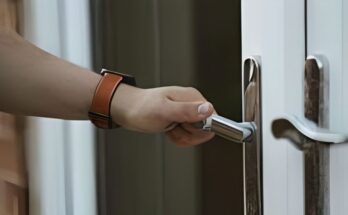As a homeowner, your top priority is to keep your home and family safe. Unfortunately, the reality is that home security is a serious concern in our modern world. Burglars and intruders are always on the lookout for easy targets, and the consequences of a break-in can be devastating.
Not only can you lose valuable possessions, but your sense of security and peace of mind can also be shattered. That’s why it’s essential to protect your home against intruders. In this article, we will discuss five essential tips that you can use to safeguard your home and keep your loved ones safe.
From securing entry points to investing in a security system, we’ve covered you with the information you need to make your home a fortress. So, let’s get started and ensure your home is protected from unwanted visitors.
1. Have a Weapon in Place
While having a weapon is not for everyone, it is an option for those who are comfortable with owning a weapon such as a firearm. Owning a firearm can give you a sense of security and can be an effective tool for protecting yourself and your home during a break-in.
One example of a firearm that could be used for home defense is the CZ Shadow 2 pistol. This handgun is known for its accuracy and reliability and a mag capacity of 18. This semi-auto pistol features a steel frame and slide, along with a comfortable grip and adjustable sights, making it a popular choice for those serious about home defense.
While a firearm can be an effective tool for protecting your home, it’s important to remember that it is also a serious responsibility. If you are uncomfortable with owning a firearm, other options exist, such as pepper spray or a stun gun.
2. Install a Security System
A security system is one of the most effective ways to protect your home against intruders. A wide variety of security systems are available, so it’s important to find the one that best fits your needs. Some basic components of a security system include door and window sensors, motion detectors, and an alarm that sounds during a breach. More advanced security systems may include cameras, home automation features, and remote monitoring capabilities.
When selecting a security system, consider the size of your home and your specific security needs. For example, a larger home may require more sensors and cameras, while a smaller home may only need a few basic components. Additionally, consider the cost of the system, including installation fees and monthly monitoring fees. While a high-end security system may be more expensive, it may also provide greater peace of mind and better protection for your home.
3. Use Quality Locks
Another key element in home security is the quality of the locks on your doors and windows. While it may be tempting to opt for inexpensive locks, these may not provide the level of security you need to keep your home safe. A good quality lock should be difficult to pick or force open and installed correctly to ensure it works.
Deadbolts are a popular choice for front doors, as they provide an extra level of security that standard locks do not. In addition to deadbolts, consider reinforcing your door frame with a steel plate to prevent it from being kicked in.
Similarly, window locks are important for preventing intruders from gaining access to your home. Make sure that all windows are equipped with sturdy locks that are in good working order.
4. Keep Your Home Well-Lit
Darkness provides cover for intruders, making it more difficult to spot them and easier for them to move around your property undetected. On the other hand, a well-lit home can deter intruders by making it more difficult for them to approach your home without being seen. Additionally, it can make it easier for you or your neighbors to notice suspicious activity around your home.
One effective way to keep your home well-lit is to install motion-activated lights around the exterior of your home, particularly near entryways. These lights will automatically turn on when someone approaches your home, making it clear that someone is watching and potentially scaring off any would-be intruders.
Additionally, consider installing floodlights around the perimeter of your home or near any outbuildings, such as a shed or detached garage, that intruders could also target.
Another effective lighting strategy is to use interior lights to create the illusion that someone is home even when you’re away. Set lights on timers or install smart lighting systems that can be controlled remotely to turn lights on and off at varying intervals. It can help to deter intruders who may be watching your home and looking for signs that no one is home.
5. Be Mindful of Landscaping
The landscaping around your home can significantly impact your home’s security. While trees can provide shade and improve the aesthetics of your property, they can also be a security risk if they provide easy access to your home.
Overgrown bushes and trees can provide hiding places for intruders and make it easier for them to approach your home undetected. For this reason, it’s important to keep your landscaping well-maintained and trimmed, especially around windows and doors.
Tall shrubs and trees can be used by burglars as hiding spots and make it easy for them to access upper-level windows. As such, it’s important to keep your landscaping well-maintained and trimmed, especially around windows and doors. This will ensure that there are no hiding places for intruders and that you can see any suspicious activity around your home.
Conclusion
Protecting your home against intruders requires a combination of common sense and good planning. Following these five essential tips can significantly reduce the risk of a break-in and keep your home and family safe. Remember, a little bit of effort goes a long way when it comes to home security. So take the time to implement these measures and rest easy knowing that you’ve taken the necessary steps to keep your home secure.




